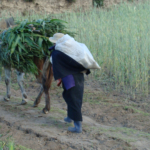


Research Community and Organizational Development Associates
Selian Agricultural Research Institute
Kenya
11/2016—11/2019
In 2014, a scoping study was conducted on Farmer Research Networks in the region. RECODA was identified as a potential partner due to its interest in participatory technology development. Since then, a recent impact study was conducted on a RECODA initiative in northern Tanzania in which they used their Rural Initiatives for Participatory Agricultural Transformation (RIPAT) methodology. The study showed that child nutrition had been improved through an integrated agricultural intervention.
RECODA is currently implementing a one-year CCRP project. In January 2016, the project conducted a baseline survey for the participating farmers in the four villages in Mtinko division in Singida District, Tanzania. The survey showed that production of pigeon pea and lablab is very limited, and there is little to no intercropping. Networking has started among the farmers in groups, and field trials are underway to evaluate intercropping of pigeon pea varieties with maize. As issues arise and are explored, networking will deepen, and additional field trials will be carried out.
This research will explore different legume varieties and will assess their performance through the involvement of a Farmer Research Network (FRN). Activities will be done in collaboration with Selian Agricultural Research Institute (SARI), which has bred several varieties of pigeon pea, maize and sorghum and is testing accessions of lablab. The project will examine how local variation in soil type and fertility influences farmer decision-making. The research will also address gaps in understanding on institutional aspects of FRN, such as what motivates farmers to participate; gender dynamics within the FRN; what type of information is given priority by farmers; and how information is communicated within and between farmer groups involved in the FRN. The project will take advantage of the strong demand for pigeon peas and lablab in the region, especially in Kenya. The project will also address the need for diversification and for coping with climate change by using drought-tolerant legumes. Finally, opportunities will be explored for legume integration to intensify and diversify production, and for improving soil fertility through the production of pigeon peas and lablab.The CCRP has engaged with RECODA in an effort to develop a strong FRN project in the region. The project seeks to improve the livelihoods of smallholder farmers in Singida District in Tanzania through enhanced food security and increased income, which will strengthen the resilience of households to adversity, including shifts induced by climate change and variability.
Activities include working with farmers to research how intercropping maize with multi-purpose legumes (pigeon pea and lablab) can increase productivity, generate additional income, and lead to better diets and more fertile soils. The participatory process will enhance farmer capacity to manage more diversified cropping systems and contribute effectively to research that meets their own particular needs. Through careful sensitization and mobilization of farmers to take charge of their own development, they will have a stronger vision of a more prosperous and sustainable future. The members of the FRN, especially the female members, will develop an increased sense of empowerment that in turn will give them a stronger say over agricultural and hence economic decisions in their families.
Overall, this project aligns with the CCRP’s emphasis on AEI approaches and outcomes such as enabling more effective collaboration, resourcing under-researched crops, supporting diversified systems, improving productivity, equity, soil health, and nutrition. Within the Southern Africa CoP, a primary focus is to research how the integration of legumes in cereal-based cropping systems through agroecological intensification (AEI) can enhance the livelihoods of rural households in a sustainable manner. The program is increasingly emphasizing farmer-centered approaches to enhance the relevance of the research and ensure that outputs are used effectively. The proposed project will work with smallholder farmers to generate and share knowledge on intercropping of maize with pigeon peas and lablab. The research is expected to lead to better understanding of how multi-purpose legume crops can benefit smallholders in a semi-arid region where soils are poor, agricultural productivity is low, and the cultivation of most crops is restricted to a short period during the year. It should also generate lessons on the potential for Farmer Research Networks (FRNs) to contribute to high quality research on issues of key importance to farmers. This legume focused grant also fits squarely within the Gates supported Sustainable Legume Intensification Initiative (SLII) focus of the CCRP.
The project is expected to lead to the following outcomes:
